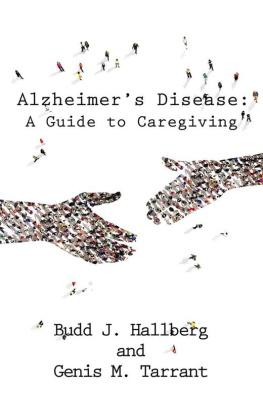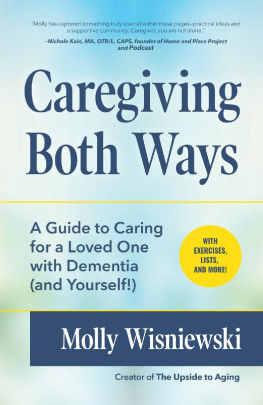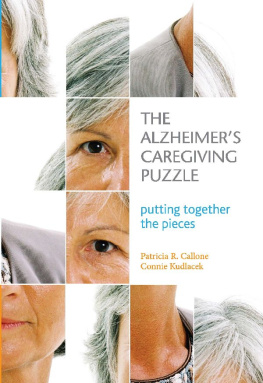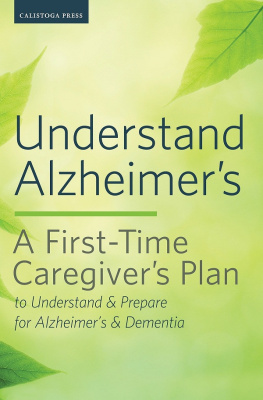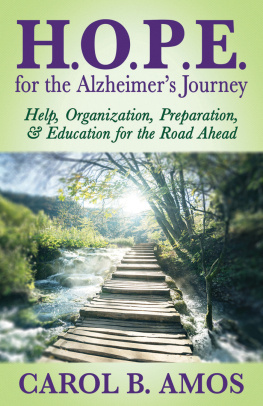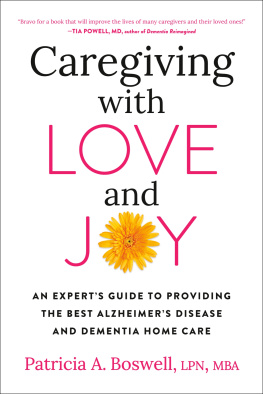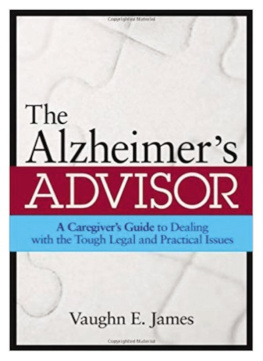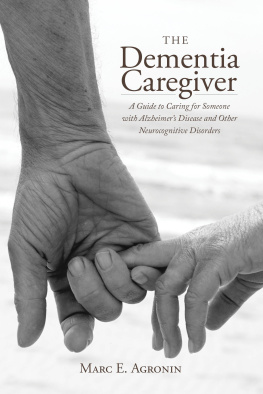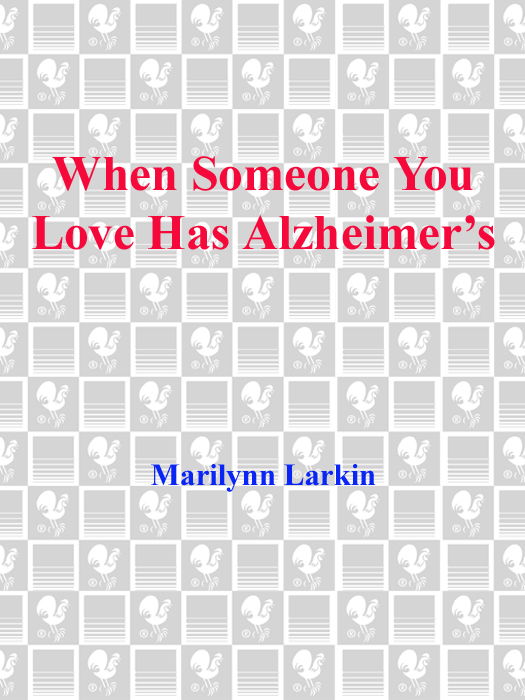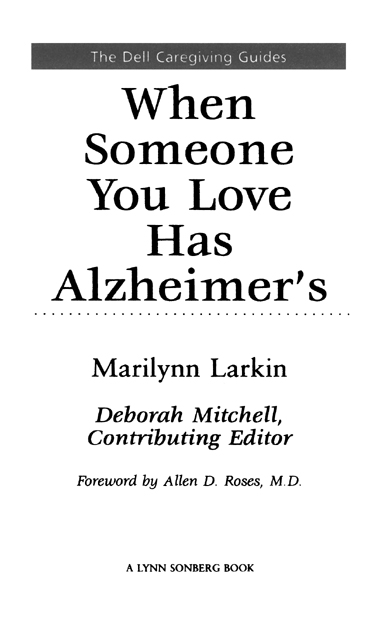DO YOU KNOW
- How simple memory aids can make a big difference?
- How reality orientation helps people who are severely confused?
- What to try to relieve feelings of anxiety and nervousness?
- What is one of the best ways to handle wandering?
- What never to tell a person with Alzheimers?
- Which strategies work best to maintain a balanced diet?
- How a social life is possible and important?
- How an adult-day-care center can be a lifesaver for both patient and caregiver?
- How to evaluate your own emotional state as a caregiver?
- What to do if you, the caregiver, get depressed or overstressed?
WHEN SOMEONE YOU LOVE HAS
ALZHEIMERS
Dell Caregiving Guides
Published by
Dell Publishing
a division of
Random House, Inc.
Research about Alzheimers disease is ongoing and subject to interpretation. Although every effort has been made to include the most up-to-date and accurate information in this book, there can be no guarantee that what we know about this complex subject wont change with time. The reader should bear in mind that this book should not be used for the diagnosis or treatment of Alzheimers disease and should consult appropriate medical professionals regarding all health issues.
Copyright 1994 by Lynn Sonberg Book Associates
All rights reserved. No part of this book may be reproduced or transmitted in any form or by any means, electronic or mechanical, including photocopying, recording, or by any information storage and retrieval system, without the written permission of the Publisher, except where permitted by law.
The trademark Dell is registered in the U.S. Patent and Trademark Office.
eISBN: 978-0-307-80833-2
Published by arrangement with Lynn Sonberg Book Associates, 260 West 72nd Street, Suite 6-C, New York, New York 10023.
v3.1
Acknowledgments
The author gratefully acknowledges the assistance of Allen D. Roses, M.D., who generously gave of his time and shared his groundbreaking research in Alzheimers disease with her. She is also grateful to the staff of the Alzheimers Association-New York City Chapter, who shared their expertise: Rea Kahn, Support Group Coordinator, and the members of her spouse support group; Anne Thomas, Home Care Aides Training Program Coordinator; Gail Hoffman, Volunteer Coordinator/Program Associate; and Jed Levine, Coordinator of Training and Special Projects. Special thanks to Deborah Mitchell for assisting in the research and preparation of this manuscript.
Contents
Foreword
Caring for a person with Alzheimers disease requires emotional strength and stamina, courage, and fortitude. In a very real sense, the caregiverspouse, child, sibling, other relative, in-law, friendis as much a victim of the disease as the person who receives the diagnosis. Shock, denial, fear, depression, and feelings of rage or helplessness are common reactions to learning that a loved one has the disease; these feelings must be accepted and eventually overcome so that everyone involved can proceed with the familiar routines and new challenges of daily life.
When Someone You Love Has Alzheimers Disease can serve as a guide and companion during this difficult time. This book presents practical strategies for helping with the many memory, communication, mood, behavior, physical, and medical problems that are symptomatic of the disease. In addition it offers advice on planning for the futurefinancial and legal considerations, as well as what to do when home care is no longer possible. A comprehensive chapter on resources enables the reader to contact numerous organizationsboth national and localthat can offer in-depth help in all these areas.
Although this book clearly offers much-needed assistance to the caregiver today, it is my hope that in the future it will no longer be needed. Recently much research in laboratories around the world has led to major breakthroughs in our understanding of the possible causes of Alzheimers disease. This new knowledge is leading to the development of better diagnostic tests and has pinpointed targets for new treatments and therapies to delay the onset of the disease and ultimately prevent it from developing. Todays caregiver may take comfort in knowing that although Alzheimers disease is taking a toll on a spouse or parent now, there is every reason to believe that research will lead to the treatment and prevention of Alzheimers disease in the future.
Allen D. Roses, M.D.
Jefferson Pilot Corp.
Professor of Neurobiology and Neurology
Chief, Division of Neurology
Duke University Medical Center
Durham, North Carolina
Introduction
Mary was engaged in one of her favorite activitiesdoing the crossword puzzle in the daily paper. I dont know whats the matter with me, she said to her husband, Jerry. The clue is Blank Velvet, the name of a song. I know the first word is a color, but I cant remember what it is.
Well, its not as bad as forgetting the name of our mailman, which you did yesterday, Jerry teased. But beneath his teasing tone, Jerry was worried. Marys memory lapses were occurring more frequently. Something was wrong with her, and that realization frightened him.
Mary is in the early stages of Alzheimers disease, a devastating illness that ultimately leads the sufferer to a state of total dependence on caregivers. The most insidious aspect of the disease is that it begins almost imperceptibly; moments of forgetfulness, among the first symptoms, are easily attributed to distraction, emotional upset, or simply a normal part of aging.
But there is nothing normal about Alzheimers. It is an organic brain disease that takes a tremendous toll on the person with the illness, the caregiver, and society at large. Currently more than four million Americans suffer from Alzheimers. The prevalence increases dramatically with age. People age sixty-five to seventy-four have a one in twenty-five chance of having Alzheimers; for those age eighty-five and older this likelihood rises to a staggering nearly one in two chance. This eighty-five-plus age group is the most rapidly growing sector of the American population, which means we may expect a dramatic increase in the overall number of people with Alzheimers in the coming century, unless preventive treatments and cures are discovered.
Alzheimers disease affects the cells of the brain, producing progressively severe intellectual impairment. At first the individual experiences only minor and almost imperceptible symptoms that may be attributed to emotional upset or other physical illnesses. The person may forget to turn off the oven, misplace things, recheck to see if a task was done, or repeat already answered questions. As the disease progresses, memory loss increases and other changes, such as confusion, irritability, restlessness, and agitation are likely to appear. Judgment, concentration, and speech may also be affected.
There are many different patterns in the type, severity, and sequence of changes in mental and neurological functioning that result from Alzheimers disease. Although the symptoms are progressive, there is great variation in the rate of change from person to person.
During the early stages the person with Alzheimers is likely to be aware that his or her mental faculties are becoming impaired. This realization can be agonizing to the person with the disease and may trigger depression and other mood changes. The decline may also have terrible emotional consequences for the spouse and children of the person with Alzheimers, especially when they are the caregivers.


